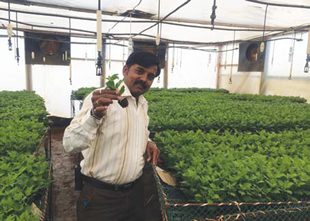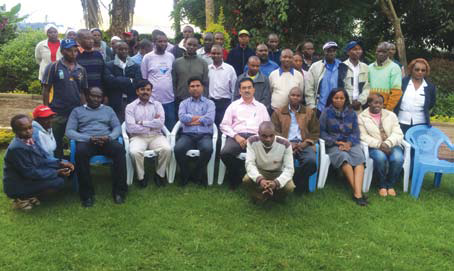 Who is Nirzar Jundre?
Who is Nirzar Jundre?
(Backgroundpersonal and as a grower) I am a Kenyan of Indian Origin. Professionally I studied B.Sc. Agriculture and Masters in Personnel management, it was my Father who sent me to study horticulture after my 10th std., and otherwise I wanted to study Mechanical engineering, immediately I developed interest in horticulture. I was good in my studies, as well as sports and managed to be general champion in Athletics during my University days.
I started my career in 1993 after graduating where I worked in companies dealing with Tissue Culture technique for plant propagation. After three and a half years, I got a chance to work with a flower farm growing Roses, Gerbera & Carnation. Three and a half years later, I got a chance to come to Kenya that is, year 2000 with recommendation from my good friend and Guru in floriculture Mr. Avinash Mokate. I joined Liki River Farm as a Flower Manager, where I initiated the first commercial Rose cultivation for Vegpro group. In the beginning it was a challenge for me to train people who had been working with vegetable production to flower growing but with team work, we succeeded. It was really a good experience.
Later I got chance to work with Waridi Ltd, one of the oldest farms in Kenya from year 2001 till 2005 as Farm Manager where I was tasked to improve the productivity and Quality as we were phasing out auction sales to Direct Sales. Again, good teamwork and support from my then MD. Mr. Richard Hechle made us succeed. I really enjoyed working very independently at Waridi and got a life experience. Later from 2005 till 2009 I got my life’s best chance to put up a complete Rose project from scratch. I managed to complete first phase of 10 ha. in one year and four months. This is what today stands as Roseto Ltd.
You have been growing and selling flowers for most of your professional life, if you would have to give your remarks about being a grower, what would they be?
I used to watch many Hindi movies earlier in my life. In most of them, the villain told the hero of the movie (who by mistake or for some purpose joined the bad gang group) “there is way to enter in this business but no exit” and I think it very well fits us floriculture professionals, and it is not by bad means but floriculture is a such an interesting profession that every day is a new day, new challenges, new things to learn etc. and that is why whoever joins this industry cannot think of leaving in life time.
Briefly discuss the challenges you have faced as a grower?
There are various challenges in floriculture especially in pest and disease management, work force management, dealing with climate change in the various zones in Kenya. As an expatriate I initially faced major challenge in gaining confidence of the co-team mates and workers. But when I made them understand that I was there for work, as an employee like them they accepted me within a short period.
What would you point out as your strongest attribute that has made you succeed as a grower?
My curiosity, passion to take challenges & to learn new things and never the less my nature to get acclimatized with the team I work with.
In your experiences, briefly discuss production, the vase life transportability and marketing of flowers in Kenya?
In Kenya we are producing the best quality flowers in the world, but we have challenges on our post-harvest handling and market access. It is a fact that Kenyan flowers last longer in vase life than flowers from other countries. This proves we are improving on our post-harvest skills, flowers treatment and cool chain management. In regard to marketing, most of the growers are currently trying direct marketing compared to some years back when most of the farms were auction based. Farms are trying to reach customers directly and are able to deliver as per their requirement.
In your experience discuss the minimum/ maximum head size in cm and stem length in cm you expected from most rose varieties in different growing areas in Kenya? Does this mean anything when a grower is selecting a variety?
It is very difficult to answer this question. It all depends on how good one is in managing his greenhouse climate, the cultural practices, fertigation etc. but still you can categorize head sizes, T hybrids to be 5-7 cm, Intermediate 3.5 – 4.5 cm & sweet hearts 2.5- 3.0 cm. Different area produce different flower quality on same variety. On the higher altitude the head sizes are bigger than on lower altitude. So some of these factors determine your variety selection criteria.
Concerning marketing, discuss auction market vs direct market. For the last one year we have seen a more aggressive marketing by flower farms with increments of direct sales compared to the auctions, what are your reasons?
Most importantly, customers are able to get more fresh flowers directly from farm by avoiding auction process and time wasting before reaching the final customer’s hand. Also all customers’ queries & complains are handled in shortest time possible. As well, growers are able to get better returns and consistent prices for their products than auction, as the auction is very uncertain.
How would you describe your time as the General Manger Black Petals.? Are you passionate about what you do?
I joined Black Petals in July 2009. I have just completed 5 years. It has been a very good experience, with wide exposure while handling various situations independently as the Directors are away from Kenya. I am very grateful to our Chairman Mr. Ehiya, CEO Mr. Mohan and my team with whose advice and support we are flourishing and have a long way to go in the business. Yes for sure I’m passionate; this is the place I have served longest so far in my professional career even with various challenges of growing flowers in this area (Limuru) which keeps me on my toes always.
What is your vision for Black Petals? What are your top priorities?
Our vision at Black Petals is to produce and supply customers the best quality flowers as per their requirement and make them satisfied. Quality is first priority and for sure quantity and consistency are key, as you can make better money with best quality, consistency and quantity.
Briefly discuss the Black Petals team? What’s the biggest challenge YOU feel your company faces, and how do you inspire your employees to meet it head on?
We at Black Petals work as a team, as without team work in any organization you cannot succeed. I am proud to say we have a very good team. The biggest challenge in our area is disease and pest management. I as a technical & human resource professional, I try to understand the team well and try to make them understand why they are there, the aim of our company and provide them with inhouse career development training rather than the hire and fire policy, I hate it.
Where do you think the most significant growth will occur in the flower sector for the next few years? Acreage, technology or market? What changes do you see in the sector in the next 5 and 10 years? What advice do you have for growers to prepare for these changes?
It is difficult to say, as the major players are trying to expand their area based on their market, the trend has been big head, long length roses. Most of them have started new farms in higher altitude areas like Nanyuki, Mau Narok, Ol-Kalao, Molo etc. Acreage I can approximate an average of 150 ha. Per year and will continue in coming years. I fore see growers putting more efforts on improving their post-harvest practices, and Kenya will be number one in the world by all means in flower industry. My advice would be as much as we grow good quality flowers in field we need to take lot of efforts to keep the same quality till the flowers reach the customers and that is possible only by training all the staff involved in the value chain including the management.
 What is your personal work ethic, and how does this affect the company culture?
What is your personal work ethic, and how does this affect the company culture?
Hard work pays!! I always tell my staff that nothing is for free, you have to earn by your hard work and then it tastes sweeter. I always share my experience with my colleagues about my past days where after graduation I joined this industry as a supervisor and slowly climbed up the ladder and reached where I am which Is out of my hard work and passion to learn.
What decisions have you made in your career that you look back on and feel that was a mistake?
I don’t have any of such incidence/ decisions in my past career which makes me feel embarrassed because I always try and involve my team managers in taking decisions, and decisions taken collectively are always good.
What are the three most pivotal moments in your career?
i) When i worked independently for the first time in my career at Waridi getting a chance to practice my professional ability in technical and HRM skills. ii) After 12 years’ experience in floriculture at various positions, in 2005 i got a chance to build up Roseto farm part of Mega Spring Group (18 ha project when I left) from scratch on my own, for which I feel very proud. iii) Now managing Black Petals part of the larger Black Tulips Group from July 2009, I feel proud to be a foundation member in expanding its wings.
Describe your ordinary day?
Do you still have enough personal time? Floriculture is very involving, I start my day as early as 5.00 am. After doing some warm up exercise, bath & prayers get to the farm between 7.00 – 7.15 am. After checking emails, I go on greenhouse rounds, around 10.00 am I deal with any administrative issues, later deal with spray meeting with production manager and the one in charge of spray around noon. After lunch any other administrative issues, post-harvest & sales related issues etc. I spend evening hours and Sundays mostly with my family.
Give your final comments.
“No Pain No Gain”, those were words from My Chairman which I always remember. I always tell my staff and colleagues that they should keep in mind the 3 C’s: Communication, Coordination and Co-operation to succeed in whatever they do as a team.
